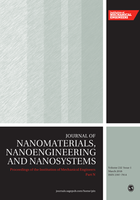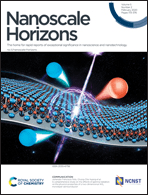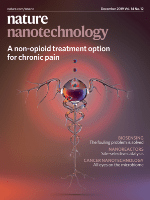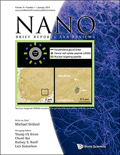
Journal of Nanoanalysis
metrics 2024
Pioneering Discoveries in Nanoscale Methodologies
Introduction
The Journal of Nanoanalysis is a leading publication in the field of nanotechnology, dedicated to advancing the understanding and application of nanoscale analysis methodologies. Published by BORNA SANJESH KIMIA CO-BSK CO, this journal aims to provide a comprehensive platform for researchers, professionals, and students to disseminate cutting-edge findings and innovative approaches in nanomaterials characterization, nanoelectronics, and related areas. With a focus on high-quality peer-reviewed articles, the journal supports the global scientific community in fostering interdisciplinary collaboration and knowledge sharing. Although currently lacking an explicit impact factor, the Journal of Nanoanalysis is poised to make significant contributions to the field, with its commitment to open access and accessibility globally enriching the pool of research available for academic and practical advancements.
Metrics 2024
 -
- 0.40
0.40 0.70
0.70 -
-Metrics History
Rank 2024
IF (Web Of Science)
JCI (Web Of Science)
Quartile History
Similar Journals

Nanobiotechnology Reports
Advancing the frontiers of nanobiotechnology.Nanobiotechnology Reports, an impactful journal published by PLEIADES PUBLISHING INC, serves as a prominent platform for disseminating cutting-edge research at the intersection of nanotechnology and biotechnology. With its ISSN 2635-1676 and E-ISSN 2635-1684, this open-access journal is committed to providing researchers, professionals, and students with accessible knowledge and innovations that drive advancements in this rapidly evolving field. Operating out of the United States, Nanobiotechnology Reports has established itself in various engineering and science categories, including Bioengineering and Biomedical Engineering, currently holding a Q4 quartile ranking in 2023. Although it is in the early stages of its publication journey since its convergence in 2021, the journal aims to foster collaboration and knowledge-sharing within the scientific community, addressing the complexities of nanomaterials and their applications in biological systems. Researchers and practitioners in nanobiotechnology are encouraged to contribute to this expanding body of knowledge, facilitating the development of innovative solutions that impact various sectors, from healthcare to electronics.

Proceedings of the Institution of Mechanical Engineers Part N-Journal of Nanomaterials Nanoengineering and Nanosystems
Transforming Ideas into Nanosystems: Your Gateway to Cutting-Edge DiscoveriesProceedings of the Institution of Mechanical Engineers Part N - Journal of Nanomaterials Nanoengineering and Nanosystems is a premier journal published by SAGE Publications Ltd that focuses on advancing the field of nanotechnology through high-quality research and critical review articles. With an ISSN of 2397-7914 and an E-ISSN of 2397-7922, this journal serves as a vital platform for researchers and industry professionals exploring the interdisciplinary applications of nanomaterials and nanoengineering. The journal has achieved a significant standing in the academic community, reflected in its Q3 ranking across multiple categories including Condensed Matter Physics, Electrical and Electronic Engineering, and Materials Science for 2023, positioning it within the 75th percentile in relevant fields. Covering topics that range from fundamental research to practical applications, the journal aims to disseminate findings that push the boundaries of materials science and engineering. With open access options available, it ensures that groundbreaking research is accessible to a global audience. The proceedings are published from 2016 to 2024 and are vital for anyone involved in the rapidly evolving domain of nanoscience.

JOURNAL OF NANOPARTICLE RESEARCH
Empowering Researchers in the World of NanoparticlesJOURNAL OF NANOPARTICLE RESEARCH, published by SPRINGER, is a pivotal platform in the interdisciplinary field of nanotechnology, encompassing atomic and molecular physics, bioengineering, chemistry, condensed matter physics, and materials science. Operating since 1999 and converging through 2024, this journal presents cutting-edge research and innovations in nanoparticle science, aiming to bridge theoretical studies with practical applications. With a diverse scope that attracts articles ranked in various Q2 and Q3 category quartiles across its fields, including Bioengineering and Nanoscience and Nanotechnology, it ranks favorably within Scopus metrics, ensuring high visibility and impact among researchers. While the journal operates under traditional access models, it remains a critical resource for professionals and students alike, empowering them to advance their knowledge and drive future discoveries in this rapidly evolving area of study.

Nanoscale Horizons
Advancing Knowledge at the Nanoscale FrontierNanoscale Horizons is an esteemed journal published by the Royal Society of Chemistry, focusing on cutting-edge research in the field of nanoscale materials and their applications. Established in 2016, this journal quickly gained prominence, achieving a Q1 ranking in Materials Science (miscellaneous) and a notable rank of #32 out of 463 in the Scopus index, placing it in the 93rd percentile among its peers. With its rigorous peer-review process and commitment to disseminating high-impact research, Nanoscale Horizons serves as a vital platform for sharing innovative discoveries and interdisciplinary advancements. Researchers and professionals are invited to explore the exciting developments in nanotechnology through this publication, fostering collaboration and knowledge exchange in an ever-evolving field. Though currently not open access, the journal ensures that significant research findings are made available to a diverse audience keen on advancing materials science.

IEEE Open Journal of Nanotechnology
Unlocking Innovations at the NanoscaleIEEE Open Journal of Nanotechnology is an innovative publication dedicated to advancing the field of nanotechnology, with a particular focus on its applications in areas such as computer science, electrical engineering, and materials science. As an esteemed publication of the IEEE (Institute of Electrical and Electronics Engineers), established since 2020, it follows a robust Open Access model, ensuring that high-quality research is accessible to a global audience without financial barriers. This journal is notable for its diverse scope and has rapidly gained recognition, achieving a commendable Q3 ranking across multiple categories, including Computer Science Applications and Materials Chemistry, according to the latest 2023 assessments. With a Scopus ranking that places it among the top journals in the engineering and materials science domains, the IEEE Open Journal of Nanotechnology is positioned as a critical resource for researchers, professionals, and students interested in the cutting-edge developments and methodologies in nanotechnology. The journal promotes interaction and collaboration among scholars and practitioners, making it a vital platform for sharing novel insights and innovations in this rapidly evolving field.

Theoretical and Experimental Chemistry
Exploring the Frontiers of Chemical KnowledgeTheoretical and Experimental Chemistry is a well-respected journal published by SPRINGER, focusing on both theoretical models and experimental methods within the field of chemistry. Operating since 1965, this journal has established a rich history of contributing to the scientific community, with a converged publication history extending through 2024. Although it currently holds a Q3 ranking in the Chemistry (miscellaneous) category and a Scopus Rank of #286 out of 408 in General Chemistry, its reputation continues to grow in the academic realm, as it provides a platform for both emerging and established researchers to share their findings. The journal does not operate on an open access model, yet it offers valuable insights into diverse chemical research that can benefit professionals and students alike. Located in New York, USA, at ONE NEW YORK PLAZA, SUITE 4600, the journal aims to bridge theoretical insights with experimental validation, fostering a comprehensive understanding of contemporary chemical challenges.

Physical and Chemical Aspects of the Study of Clusters Nanostructures and Nanomaterials
Innovating at the Intersection of Physics and ChemistryPhysical and Chemical Aspects of the Study of Clusters, Nanostructures, and Nanomaterials is an esteemed open-access journal published by TVER STATE UNIVERSITY, dedicated to advancing the scientific discourse surrounding the intricate interplay of physical and chemical properties in nanostructure materials. Launched in 2017, this journal provides a vital platform for researchers, professionals, and students to disseminate and access cutting-edge findings in the rapidly evolving fields of nanotechnology and materials science. With an ISSN of 2226-4442 and an E-ISSN of 2658-4360, it aims to bridge the gap between academic research and practical applications. By facilitating open access to high-quality research, the journal plays an essential role in promoting innovative solutions to contemporary challenges in engineering, materials development, and related industries. The journal's scope includes but is not limited to the synthesis, characterization, and functionalization of nanomaterials, ensuring comprehensive coverage of this multidisciplinary field.

Nature Nanotechnology
Exploring the Boundaries of Nanotechnology Research.Nature Nanotechnology, published by NATURE PORTFOLIO, stands at the forefront of scientific innovation, focusing on the rapidly evolving field of nanoscience and nanotechnology. With an impressive impact factor and ranking in the top Q1 quartiles across multiple disciplines—including Atomic and Molecular Physics, Bioengineering, and Materials Science—this journal is a pivotal resource for researchers and professionals dedicated to advancing knowledge and applications at the nanoscale. Its diverse scope encompasses cutting-edge research that bridges disciplines, addressing critical challenges in engineering, physics, and biomedical fields. Although the journal currently does not offer an open-access option, readers can access a wealth of information that is vital for anyone involved in pioneering research and development efforts. With its robust editorial standards and a commitment to publishing high-caliber, groundbreaking work, Nature Nanotechnology serves as an indispensable platform for the dissemination of transformative ideas that will shape the future of technology and science.

NANO
Transforming Insights into Nanotechnology AdvancementsNANO is an esteemed academic journal published by World Scientific Publishing Co. Pte Ltd, focusing on the frontier of nanoscience and nanotechnology. With ISSN 1793-2920 and E-ISSN 1793-7094, this journal has been a pivotal platform for disseminating innovative research from 2008 to 2024. Located in Singapore, NANO has established itself within the academic community, currently holding notable rankings in the Q3 Category for both Condensed Matter Physics and Materials Science, as well as a Q4 Category status in Nanoscience and Nanotechnology. Though it operates under a non-open access model, its contributions are invaluable for researchers, professionals, and students seeking to stay abreast of the latest advancements and interdisciplinary approaches within the nanoscale domain. By providing in-depth articles, reviews, and insights, NANO plays a significant role in advancing our understanding of materials at the nanoscale, thereby fostering innovation and collaboration across related fields.

Nanoscience and Technology-An International Journal
Pioneering Research at the NanoscaleNanoscience and Technology-An International Journal, published by BEGELL HOUSE INC, is a leading platform dedicated to the rapidly evolving fields of nanoscience and nanotechnology. With its ISSN 2572-4258 and E-ISSN 2572-4266, the journal serves as a crucial resource for researchers, professionals, and students alike, focusing on advanced materials, condensed matter physics, and mechanics of materials. It holds a commendable position in the scholarly community, evidenced by its Q2 ranking in 2023 across multiple categories including Condensed Matter Physics and Materials Science. The journal aims to disseminate high-quality research, promote interdisciplinary collaboration, and facilitate innovation within the nano realm. With its convergence period from 2019 to 2024, it continues to attract a diverse array of studies and insightful contributions, reinforcing its importance in shaping the future of nanotechnology and its applications.